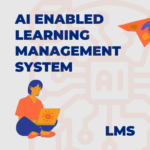The Power of AI-Enabled Cloud LMS: The convergence of Artificial Intelligence (AI) and cloud technology has transformed various industries, and education is no exception. AI-enabled Learning Management Systems (LMS) on the cloud are revolutionizing online learning experiences, providing learners and educators with enhanced capabilities and unprecedented opportunities. In this article, we will delve into the advantages of adopting an AI-enabled LMS on the cloud and explore how this dynamic combination is shaping the future of education.
- Intelligent Content Recommendation: AI algorithms embedded within cloud-based LMS platforms have the ability to analyze learners’ preferences, behaviors, and performance data. Leveraging this information, AI can provide intelligent content recommendations, suggesting relevant courses, modules, or resources based on learners’ individual needs and interests. This personalized approach enhances learner engagement and encourages self-directed learning, as learners receive tailored recommendations that match their learning goals and aspirations.
- Adaptive Learning Pathways: AI-powered cloud LMS platforms enable adaptive learning pathways by continuously assessing learners’ knowledge, skills, and progress. Based on real-time data, AI algorithms can dynamically adjust the learning path, presenting learners with appropriate content and challenges based on their individual proficiency levels. Adaptive learning pathways ensure that learners receive personalized instruction and support, maximizing their learning outcomes and minimizing knowledge gaps.
- Intelligent Assessments and Feedback: AI-enabled LMS platforms leverage natural language processing and machine learning techniques to automate and enhance the assessment and feedback processes. Intelligent assessments can analyze learners’ responses, provide immediate feedback, and generate comprehensive performance reports. By automating grading and feedback mechanisms, educators save time, while learners receive instant and personalized feedback, allowing them to reflect on their progress and make improvements.
- Automated Content Generation: AI algorithms integrated into cloud LMS platforms have the capability to automate content generation and curation. By analyzing vast amounts of educational materials, AI can create and recommend relevant content, saving educators valuable time and effort. This automation streamlines the content creation process and ensures that learners have access to up-to-date, diverse, and engaging resources.
- Natural Language Processing and Chatbots: Cloud LMS platforms powered by AI often incorporate natural language processing (NLP) capabilities and intelligent chatbots. NLP allows learners to interact with the LMS using their natural language, enabling them to ask questions, seek clarifications, and receive instant responses. Chatbots provide personalized support and guidance, offering a seamless learning experience and addressing learners’ queries promptly. This AI-driven assistance enhances learner engagement and reduces the burden on educators, enabling them to focus on more complex and personalized interactions.
- Predictive Analytics and Early Intervention: AI-powered cloud LMS platforms leverage predictive analytics to identify patterns and trends in learners’ data. By analyzing past performance, engagement metrics, and behavioral patterns, AI algorithms can predict potential challenges or areas where learners might struggle. This proactive approach enables early intervention strategies, allowing educators to provide targeted support, interventions, or additional resources to help learners overcome difficulties and stay on track.
- Enhanced Data Analytics and Insights: Cloud-based AI-enabled LMS platforms offer robust data analytics and reporting capabilities. Educators and administrators can gain deep insights into learner performance, engagement patterns, and overall course effectiveness. These insights enable evidence-based decision-making, helping educators refine instructional strategies, optimize course design, and tailor interventions to individual learners’ needs. The rich data provided by AI-powered LMS platforms supports continuous improvement and empowers educators with actionable information to enhance the overall learning experience.
- Collaborative Learning and Social Engagement: AI-enabled cloud LMS platforms foster collaborative learning and social engagement by leveraging intelligent features. These features include discussion forums, virtual classrooms, and peer-to-peer networking capabilities. AI algorithms can facilitate group formation, recommend study partners, and analyze social interactions to identify and foster effective collaboration. By promoting interaction and knowledge-sharing among learners, AI-powered cloud LMS platforms create a vibrant learning community, enhancing engagement and facilitating deeper understanding.
The marriage of AI and cloud technology in the realm of LMS has opened up new frontiers in online education. AI-powered cloud LMS platforms offer intelligent content recommendations, adaptive learning pathways, automated assessments, personalized feedback, and enhanced data analytics. By harnessing the power of AI and cloud technology, educators can create highly tailored and engaging learning experiences, empowering learners to achieve their full potential in the rapidly evolving digital age.




